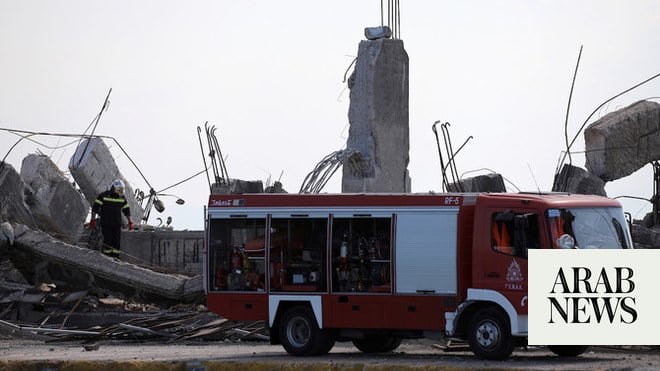
At least 22 people have been killed and hundreds injured after a powerful earthquake in the Aegean Sea toppled buildings in the Turkish city of İzmir and created sea surges on at least two Greek islands.
Turkey’s disaster and emergency authority (Afad) said the quake, measuring about 7.0 in magnitude, struck at 2.51pm local time (11.51am GMT) on Friday. One of the dead had drowned, Afad said. 709 people were injured, Afad said.
Two people were reported to have been killed on the Greek island of Samos.
The death toll is expected to rise, with the mayor of İzmir telling CNN Türk that at least 20 buildings had collapsed in the city. İzmir is home to 4.5 million people and serves as a gateway to several holiday resorts.
The earthquake originated about 11 miles (17 km) off İzmir province and eight miles north of Samos, at a relatively shallow depth of about 10 miles.
Afad put the magnitude lower than the US Geological Survey’s 7.0, at 6.6, while the European-Mediterranean Seismological Centre said the quake had a preliminary magnitude of 6.9.
The cities of Bornova and Bayraklı also suffered significant damage, the Turkish interior minister, Süleyman Soylu, tweeted.
Greek media reported rockfalls and some damage on Samos, where two teenagers on their way home from school died after being struck by a wall that collapsed, and 19 others were injured. The island, which is home to 45,000 people, including around 7,000 refugees, mostly consists of low-rise buildings.
Local people have been urged to stay away from coastal areas in case of a tidal wave or further tremors, Efthymios Lekkas, the head of Greece’s organisation for antiseismic planning, told Skai TV.
Dramatic footage broadcast by Turkish television and shared on social media appeared to show flooding and sea water receding in the Turkish coastal city of Seferihisar and Greece’s Samos and Chios, which the mayor of Seferihisar described as a “small tsunami”.
Cars and household contents such as refrigerators, chairs and tables were swept through Seferihisar’s streets by fast-moving water.
Mazlum Vesek, a reporter for the local newspaper Ege Telgraf in İzmir, said he had visited a hospital emergency room and counted scores of wounded people. Vesek said he was walking down the street when the quake struck and “the ground flipped under my feet like a rug”. He shared photographs and video of people screaming and trying to dig out survivors from one of the city’s wrecked blocks of flats.
“There are no numbers for deaths and casualties yet but the hope of not having any is really low, looking at the buildings collapsed here in [the worst hit neighbourhood] Manavkuyu,” he said earlier in the afternoon. “People are all out on the streets because they don’t want to go inside.”
The Turkish president, Recep Tayyip Erdoğan, said “all of our state’s capabilities” had been dispatched to help those affected by the earthquake. Search and rescue operations had been initiated across İzmir province as night fell, with 38 ambulances, two ambulance helicopters and 35 medical rescue teams already at work in İzmir and more than 100 personnel from the rest of the country on their way.
Local people used their bare hands and chainsaws to cut through the wreckage while shouting for onlookers to be quiet so they could hear people trapped inside. One woman was rescued alive from the rubble in footage broadcast by CNN Türk, while rescuers made mobile phone contact with a girl trapped under the debris.
İzmir governor, Yavuz Selim Köşger, said more than 70 people had been rescued from partially destroyed buildings so far.
Residents unable to return to unsafe homes could seek shelter at local mosques, said Ali Erbaş, the head of Turkey’s religious authority. One İzmir hospital moved some of its patients – still strapped into their beds and hooked up to drips – on to the street as a precaution against aftershocks.
Despite escalating tensions between the two Nato allies over hydrocarbon exploration in the eastern Mediterranean, Ankara said the foreign ministers of Turkey and Greece had spoken by phone and stood ready to help one another.
The Greek prime minister, Kyriakos Mitsotakis, also called Erdoğan to offer his condolences on Friday evening. “Whatever our differences, these are times when our people need to stand together,” Mitsotakis wrote on Twitter.
Turkey, which sits on several active faultlines, is no stranger to deadly earthquakes. The most devastating in recent history was a 7.4-magnitude quake in the western Marmara region near Istanbul in 1999, which killed more than 17,000 people.
In Greece, two people on the island of Kos were killed in a quake in July 2017.
On Friday some shaking was felt in Istanbul about 300 miles (500km) away, as well as in Athens, the capital of Greece, although no damage was reported in either city. The earthquake was felt as far away as Bulgaria.











